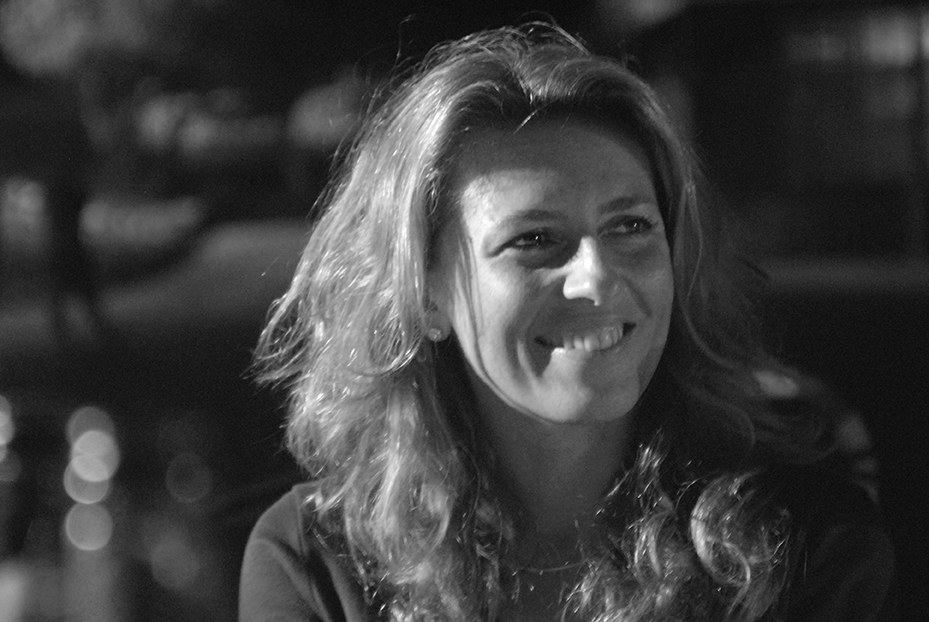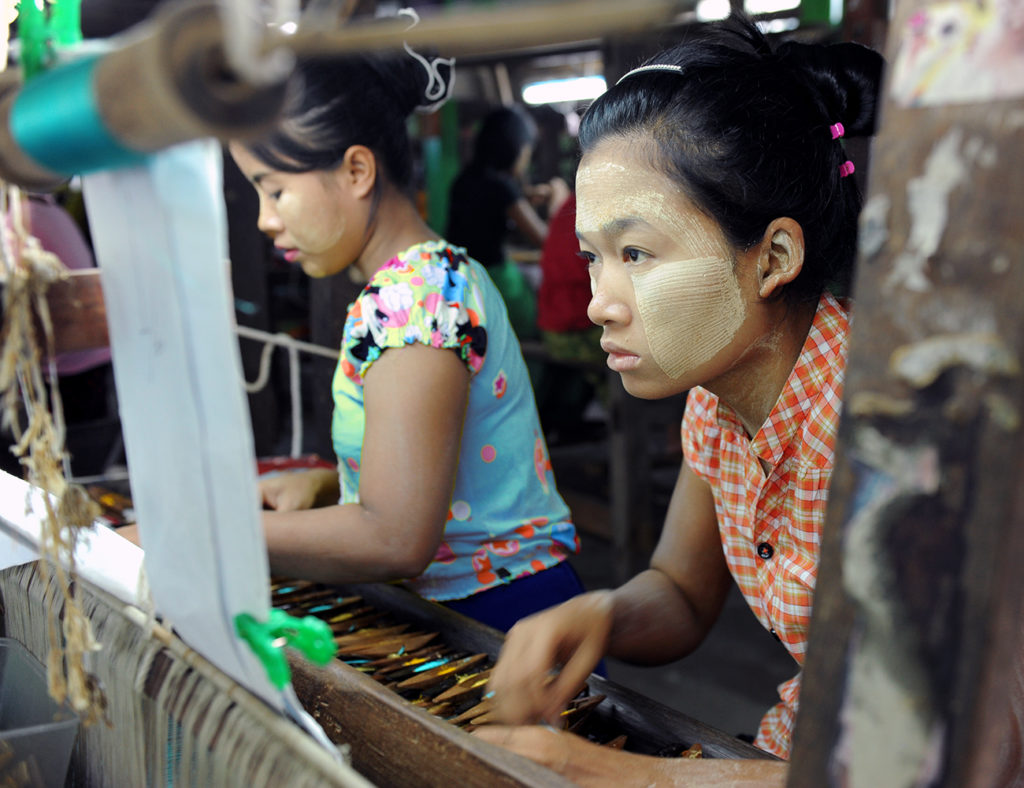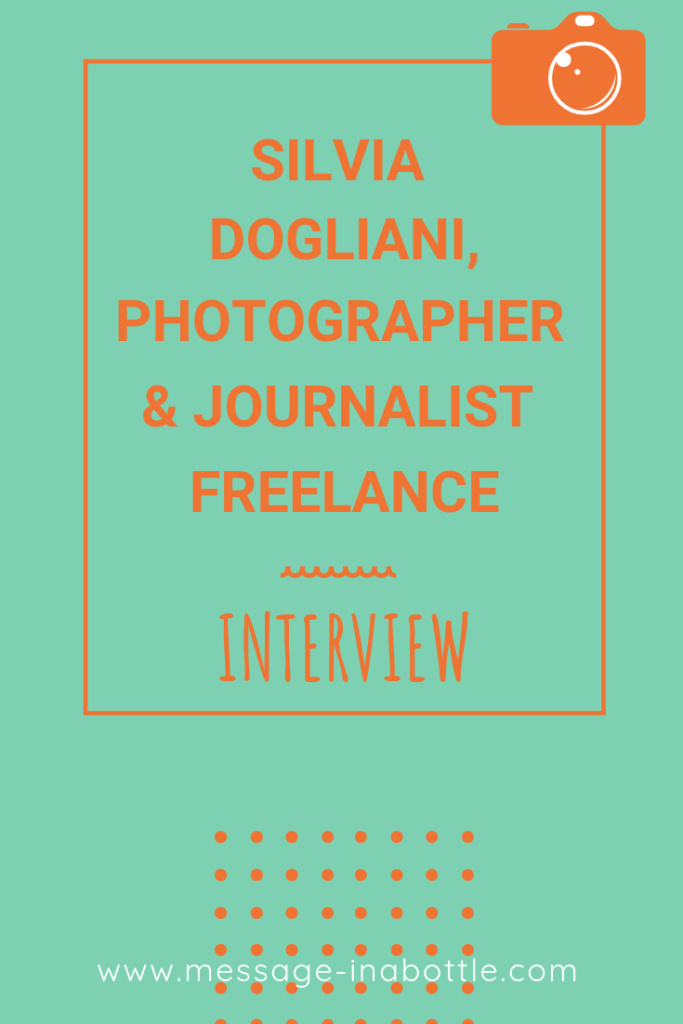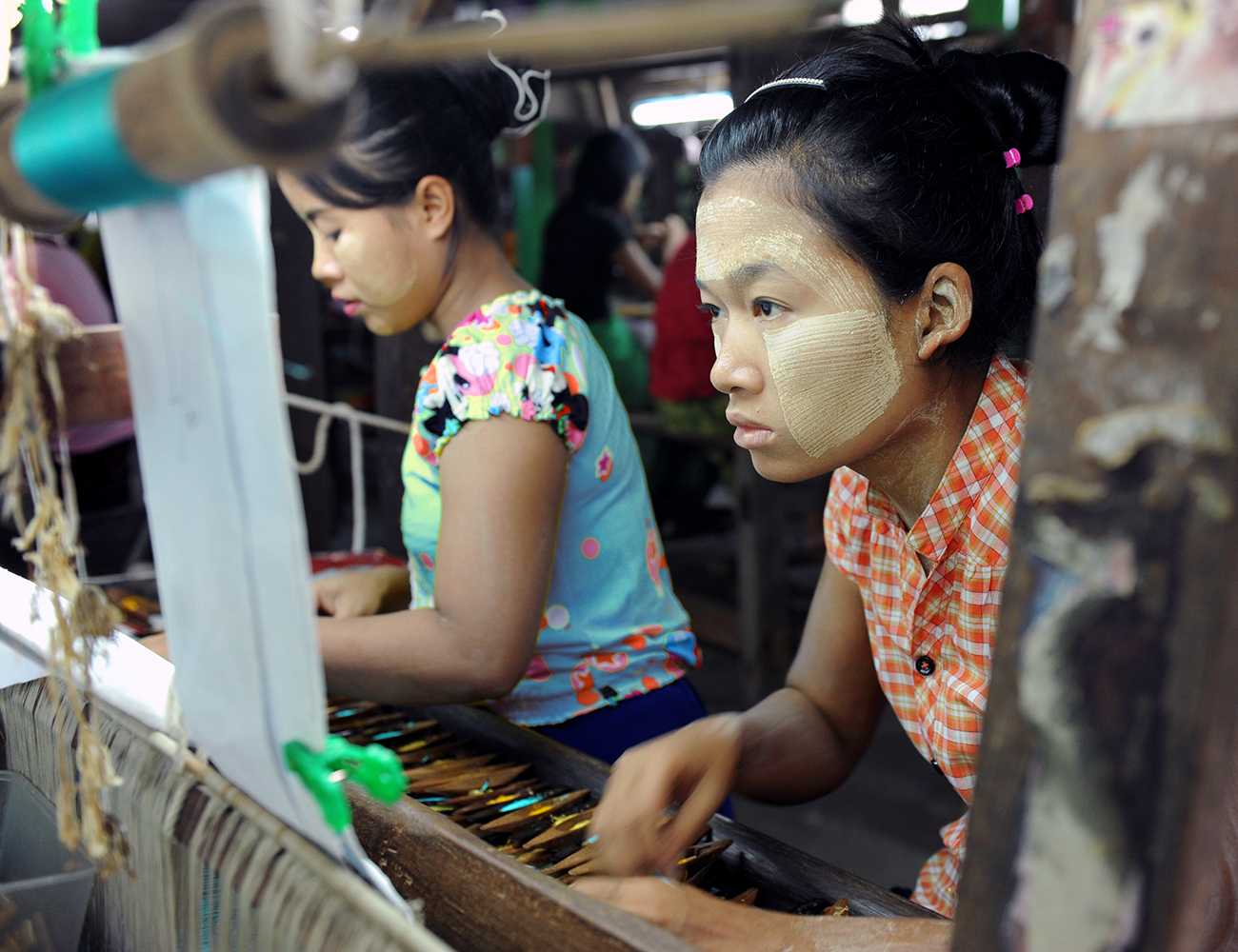When I tell you to follow your instinct when attending networking events, this interview is certainly the proof. Freelance life is made of beautiful encounters.
I met Silvia Dogliani in an art gallery in Singapore while she was passing through for a few days. I heard her name, her accent and most of all, that she was a photographer and a photojournalist. I waited and I began to talk to her in Italian. I do not know why, but I remember that I felt I needed to talk to her. I approached her in Italian and we started chatting.

Whithout even realizing it , I asked her if she agreed to take pictures of me. And the result is the beautiful photos of my website. Those of myself.
However, Silvia doesn’t usually take this kind of pictures. It was a real gift from her. So I decided to interview her to explain her job as a freelance photojournalist.
Another photographer, you’ll tell me! Great, it means that you have already read the interview of Fabrice Dieudonné, a photographer-diver in Koh Lanta!
If these two interviews have some points in common, the job is not quite the same.
I let you discover the story of Silvia Dogliani, freelance photojournalist.
How did you start doing photography?
My maternal grandfather was passionate about photography. Since I was young, I used to look at black and white photos at home and I was already very interested. Later on my other grandfather gave me as a present my first real camera, a Yashica. Before that, I had already used small basic cameras, but it was with this one camera that I really started doing “photography”. Afterwards, I took photography courses in my small town in Italy.
When I was 14, I went to New York to visit my mother’s friend who also had the same passion. One day, she took me to a camera oscura, next to the Columbia University, which could be rented to an association. She explain how to develop the photos. It was magic! I think I decided that day I wanted to become a photographer.
What kind of background do you have?
I spent my senior high school year in the United States as an exchange student. There, I worked as assistant for a photo studio specializing in wedding photography.
When I graduated from high school, I had to choose which university to enroll in: photography or journalism? I loved both and I didn’t know what to do. Writing, indeed, was my other passion and my favorite hobby. Since I was little I used to write short stories. Finally, I took my decision: I chose Photography at the Istituto Europeo di Design in Milan and, parallel, I enrolled in the University of Political Sciences.
It was very difficult to attend both faculties at the same time. I remember that I was busy all day with the photography courses and then I was studying during the night for the Political Science exams. Luckily, I was part of a group of students who helped me a lot: they gave me their notes and studied with me. When I passed the first exam at the faculty of Political Science, I decided I could make it and I went on.
First, I graduated in Photography then, I had my degree in Political Science.
While attending the university, I worked for few photographers as an assistant. Then, I proposed some articles to the magazine Cosmopolitan, starting a collaboration. Later on I had the chance to meet a student at the University whose parents had a publishing house. He introduced me to his family and few days after my graduation I started working in the journalism field.
Which skills do you think you need to have to be a photographer?
I think you need to be curious. You must have good eyes, but you also need to have passion. You have to be dynamic, look around you and don’t stay at home, waiting for something to happen. You have to move and, if you have the opportunity, to travel as much as you can to get inspired.
You also have to read books and magazines, watch the news, go to the museums and exhibitions and look at the other photographers’ work to develop your own style.
And, of course, you need some creativity and imagination!
How do you find ideas of topics to work on?
I focus mainly on reportage, people and social issues.
The first question I ask myself is whether or not the story will interest a large audience or if it interests me only.
Before working on a story I do lots of research, I read news, I check if there are any interesting and unexplored angles to start with.
If all these conditions are fine, I go on. If not, I leave it.
Are press agencies or magazines that commission you a reportage?
It depends. But most often I bring them ideas and then, if they are interested, they tell me their needs or give me some directions on how to better develop the reportage.
When you work regularly with magazines, like I did in the past, normally you agree weekly or monthly on a list of topics to cover. And, if you have extra time, you can focus on subjects that interest you most. But you need to have time!

Do you also exhibit your work in art galleries?
I have already done few exhibitions, although mostly I work for magazines. Organizing photo exhibitions is a project that I would really like to develop.
With which kind of equipment do you work with?
It’s very important to have good equipment, but not to focus just on that. You need to know the culture that is behind photography, not just the technology. This is my advice that I address especially to young people who I see very focused on equipment.
I have been using Nikon for a long time. I work with a D-700. I think it’s almost more important to have a good lens than a good camera, but if you have both is even better! And for the lens, I mainly use a 24-70mm 1: 2.8.
For computers, there is Mac and PC, for photography there is Nikon and Canon!
What do you like most about your job as a freelance and what you don’t like?
I love my job. I do it always with enthusiasm and passion. And with it I have the opportunity to travel, which I like very much. Photojournalism is a profession of passion. To do your job well you must love it, but, certainly, you need also to have an economic return.
Uncertainties, especially those of recent times, is what I don’t like of this job. Few years ago, we had to compete with experienced reporters. Now, everyone claims to be a photographer or a journalist. You cannot compete in such conditions, it can no longer be called “competition”. It’s just harder to show, as a professional, that behind your work there is a lot of research and reflection. There is also an ethical and deontological code that you learn with years of experience. And that is why we take time to check our sources and do the necessary research.
As a result, professionals seem to be too expensive, too slow or too difficult to work with. Unfortunately there is less and less place for them. In order not to be excluded, we are forced to accept ridiculous economic compromises. Personally, when I feel that it is really too much, I don’t accept it.
You have already talked about the arrival of digital. Can you tell us more?
With traditional photography, you used a lot your brain: you really had to think before shooting. taking a picture, while choosing a subject, during the shooting and finally, during the great development work.
There
was also the charm of waiting: in your head you already knew the
result, but you
couldn’t be sure until you had your film developed. What
was done was done, you couldn’t go back.
Now, we are aware of
having more chances to take a good photo, we can take as much
pictures as we want without worrying about the film cost or the
frames limit. With digital photography we can see immediately the
result and I don’t like it. I know I can make many mistakes without
being penalized and therefore I feel I am not concentrated as much as
I was before.
In addition, after the shooting there is the postproduction: the hard job of selections and calibration of all images.
Compared to the past, postproduction has, indeed, completely changed. There is no more time to discuss with your colleagues. Now you need to look at the screen and choose quickly. Slides or printed photos, which I loved, are no longer there.
With traditional photography, as I said before, I liked the long wait before looking at my slides or negatives. With the digital, what excites me most, is the moment when I press the shutter button.
What do you think about Apple ads using large scale photos made with an iPhone to demonstrate its products quality?
I must say that Iphones makes now beautiful pictures. But it is not really for me. Without my camera lens I must do only what the Iphone wants and not what I want. I can’t stand it.
But I see great results, especially among young people. The experimental side fascinates me. Trying things is always positive and stimulating.
And what do you think about the social media?
I like and I hate social networks. I like it, because it allows to have an incredible opening and, to me, it is very important. I really like watching the work of others and, at the same time, it is also a good way to promote my work. But you need to know how and which social network to use and get trained by experts.
On the other side, I think that social networks can also trivialize the photo. Plus, the egocentric way of showing your private life makes me sad and mad.
Social media trends can become a limitation for creativity: photographers do what everyone does. But a good photographer works with his eye, his heart, his different vision. He does not follow trends, but his own point of view. Having a good knowledge of the history of photography is very important to develop your own style.
What is the strongest memory of your career?
I’ve got a lot of them, obviously!
I remember when I was in India for the 25th anniversary of Independence. I covered the celebrations for Cosmopolitan. I was still working with a traditional camera at that time and I was shooting in black and white. Suddenly a family arrived holding a flag. I knew immediately that that picture was simply great and I shot.
Right after, all my equipment was stolen. I lost all my work. I was shocked.
Still today, after all these years, the memory of that moment and that photograph is clear: their faces, their expression, the framing, the light, the shadows … Every detail of that image is impressed in my mind and in that film, lost in nothingness.
What advice would you give to young photographers?
In addition to those I mentioned already, I would say: stay humble! There are plenty of photographers better than you. Always.
Accept criticisms with a smile. Take it as an opportunity to improve. I did it and I keep doing it.
Try to work on quality rather than quantity .
At the practical level, I would say: don’t be afraid to call or meet your contacts, not only from your screen. I really think that a call, a real physical contact, changes something.
Be generous! Share, exchange, help your colleagues to improve. I learned a lot from the precious advices of other photographers who were generous.
I do share my secrets, but only with someone who deserves it!
And to the unprofessional?
Have fun and enjoy it!
If you like to take pictures with your iphone, go ahead. But try to build your own style. Don’t do what others do. Try to distinguish yourself.
What are your plans ? Your craziest dreams?
There are plenty!
Among the projects, get closer to the Arab culture and return to the Middle East.
I would like to spend more time on artistic projects and focus on exhibitions and galleries
And my dream? To live between Italy and Morocco. I dream of buying a riad near the sea and turn it into my part-time home, my studio, a place to welcome friends and artists for an exchange or where to organize exhibitions.
To discover Silvia’s work, visit her website: www.silviadogliani.com/ or follow her on Instagram.
She also regularly manages the magazine Focus Méditerranée where you can find some of her reportages.
Did you have the click?

par Delphine Berclaz
